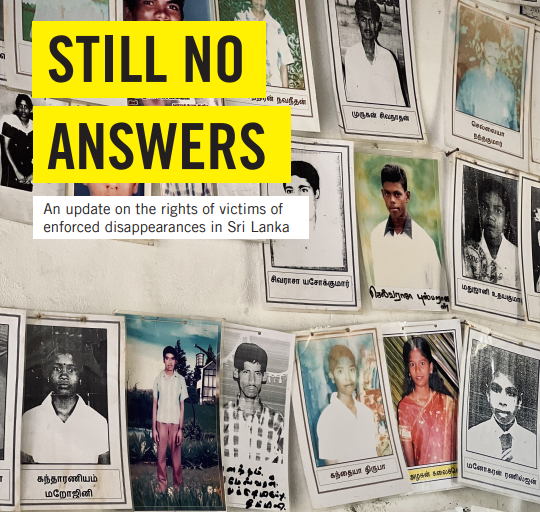
A new publication from Amnesty International highlights the “deteriorating human rights situation” in which state authorities have harassed, intimidated, and violated the civil liberties of families of the disappeared, who have been failed by Sri Lankan mechanisms on promises of delivering justice.
The new publication from Amnesty highlights how Tamil family members of those who have disappeared are facing increasing hostility from the Sri Lankan state. Authorities have used a number of intimidation tactics in an effort to hinder attempts by families to seek answers regarding their loved ones. These tactics include “harassment and intimidation of victim families... through unannounced visits, intimidating phone calls, surveillance and taking photographs during protests”. Those seeking justice have seen a return of ‘white van’ style abductions, a tactic that had previously caused a number of enforced disappearances from 1983-2009. Authorities have also issued pre-emptive court orders against activists using a number of existing domestic laws. These court orders effectively restrict activists’ right to peaceful assembly – a right that is outlined in the Sri Lankan Constitution. One of the laws used to issue these court orders includes the draconian Prevention of Terrorism Act (PTA). The PTA has been slammed by UN experts and the Human Rights Watch as a law that has regularly been used to violate the civil liberties of Tamils and Muslims on the island.
In addition to the active attempts by authorities to obstruct protests and intimidate activists, Amnesty International also outlined and condemned Sri Lanka’s negligence over enforced disappearances – particularly with regards to the Office of Missing Persons (OMP). In 2015, the OMP was established with a stated goal of locating “missing persons” and providing clarity around “the circumstances in which persons went missing”. However, since its formation, the OMP has repeatedly come under criticism as being an inadequate mechanism that lacks trust from victim families. Tamil mothers in the North-East have been particularly vocal about OMP’s shortfalls, highlighting the OMP’s refusal to acknowledge state involvement in enforced disappearances. OMP members are directly appointed by the president and clearly prioritize state interests while simultaneously ignoring the concerns of victim families. Upali Abeyratne is one of these members, and Amnesty highlighted how Abeyratne “...served as the chairman to the Presidential Commission of Inquiry on Political Victimization, when the Commission attempted to interfere in the prosecution of state actors accused of enforced disappearances”.
Amnesty recommends that the Sri Lankan government “...create an enabling environment for the families of the disappeared...” and called on the international community to “rigorously monitor Sri Lanka’s deteriorating human rights situation, including the impact on victims of enforced disappearances, with a view of pursuing avenues for international justice where sufficient evidence exists”.
Read the full publication here.
